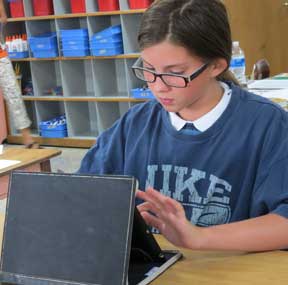
 CHARLESTON/MOUNT PLEASANT—Two schools in the Charleston area started iPad programs for their students and teachers this year.
CHARLESTON/MOUNT PLEASANT—Two schools in the Charleston area started iPad programs for their students and teachers this year.
Christ Our King-Stella Maris purchased the devices for each child in grades fifth through eighth, and Charleston Catholic bought them for students in sixth through eighth.
Officials said it is part of a move to bring schools into the 21st century through the use of digital tools and to stop relying on expensive and outdated textbooks.
Steven Zimmerman, a teacher at Christ Our King, said iPads will allow them to download books at a lower cost than purchasing hardbacks. For example, there’s a science book that allows students to zoom in and explore elements such as a DNA strand. It costs $15 each as opposed to about $100 for standard textbooks.
Students will also be able to download worksheets and notes so nothing gets lost, and trees are saved, said John Byrnes, school president.
Other schools that use the technology praise the educational possibilities of all the apps available.
 Victoria White, instructional specialist at St. John Neumann in Columbia, said their students “can take virtual tours of the galaxy using our NASA app or look closely at minerals and rocks with a geology app.”
Victoria White, instructional specialist at St. John Neumann in Columbia, said their students “can take virtual tours of the galaxy using our NASA app or look closely at minerals and rocks with a geology app.”
Students are into it because lessons like Tic Tac Fraction are fun.
Teachers, many of whom were apprehensive about iPads, are embracing the technology, school officials said.
Fred McKay, principal at Charleston Catholic, said some teachers are making podcasts of class lessons. If students are absent or miss something in their notes, they can review at home. Instructors are also using apps that provide short reviews and interactive practice in subjects like math, which is great for homework.
Students have gone from spectators to participants in many lessons. In art class at Christ Our King, students used iPads to call up photos they took for homework, then followed the teacher’s instructions on how to zoom in, crop and create a portfolio.
“We can do a lot more with school and learning, and everything’s a lot faster,” said Jerrod Brown, a seventh-grader there. He did caution teachers to pay attention so students aren’t playing games instead of working.
Byrnes said they are able to closely monitor what the students are doing and can shut the iPad down remotely if they access anything inappropriate. The school can also track the device if it’s misplaced.
Other schools in the diocese also have iPad programs or use technology such as roving computer labs, whiteboards, and clickers, which is a student response system that tracks answers.
But not all schools can afford the technology. Some employ Bring Your Own Technology days and find creative ways to tie it into the lesson.
The discrepancy between have and have not will be addressed by the diocesan comprehensive technology plan.
